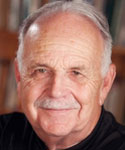Noted scholar and writer will discuss academic freedom
At this year’s Campbell Lecture Series, a major name in the humanities will discuss a major topic in education: Stanley Fish will offer three public lectures about academic freedom.
The School of Humanities’ annual series is designed for digging deep – lectures are spread out over three evenings, with a single speaker approaching a topic from multiple angles. Fish will begin his discussion of academic freedom April 10, then follow up with additional lectures April 11 and 12. The talks, which are free and open to the public, will begin at 6 p.m. each night and will be in Herring Hall, Room 100.
The committee that chose this year’s lecturer wanted to find an accessible intellectual, said Cary Wolfe, the Bruce and Elizabeth Dunlevie Professor of English and chairman of the English Department. They wanted a serious academic who’s also an effective speaker, he said.
“We zeroed in on Stanley because he’s almost an ideal exemplar of that combination,” Wolfe said, “having a very distinguished academic career but also being what you might call a ‘public intellectual.’”
Fish’s career has made him a familiar name in academic circles and beyond.
He’s a professor of law and the Davidson-Kahn Distinguished University Professor at Florida International University. He has taught at the University of California at Berkeley, at Johns Hopkins, at the University of Illinois, Chicago, and at Duke, where he was a professor of English and law. He also spent several years as executive director of the Duke University Press.
Fish first made his name as a Milton scholar in the 1960s and soon became a major voice in literary theory. He later branched out into law and built a career in university administration. He has written several books and penned a monthly column for the Chronicle of Higher Education. And for the past several years, Fish has written a weekly online column for The New York Times that focuses on education, law and society.
The Campbell Lecture Series was made possible by a $1 million contribution from alumnus T.C. Campbell ’34, who wanted to further the study of literature and the humanities with an annual series of public lectures. This year’s lectures will be scholarly but have broad appeal, said Wolfe, who earned his Ph.D. in English at Duke when Fish was chairman of the department.
“No. 1, I’ve always found [Fish] just a brilliant rhetorician,” Wolfe said, “and No. 2, I think he’s really funny.”
Fish has said he will address the issue of academic freedom in each of his three lectures and explore several distinct schools of thought on the matter. That willingness to explore divergent viewpoints is one of Fish’s strengths, Wolfe said.
“The thing I admire most about Stanley is that he has never had any patience for orthodoxy – of either the left or the right,” Wolfe said. “Stanley has always, very refreshingly, been willing to challenge and question and re-examine what’s become the pious party line, wherever it is on the ideological spectrum.”
The lectures will be published after the event; Rice has partnered with the University of Chicago Press to publish each series of lectures as a book, which creates a lasting record of each three-part exploration of a specific topic. Previous lectures, including those by poet Robert Pinsky and Shakespearean scholar Stephen Greenblatt, are available for purchase in print and in electronic form.
For more information, visit the Campbell Lecture Series website at http://campbell.rice.edu.



Excellent choice for the Campbell Lectures. Not without controversy or detractors, it’s important to remember that the most important intellectuals to ever walk the face of the earth have always attracted controversy and detractors. Look forward to these talks!